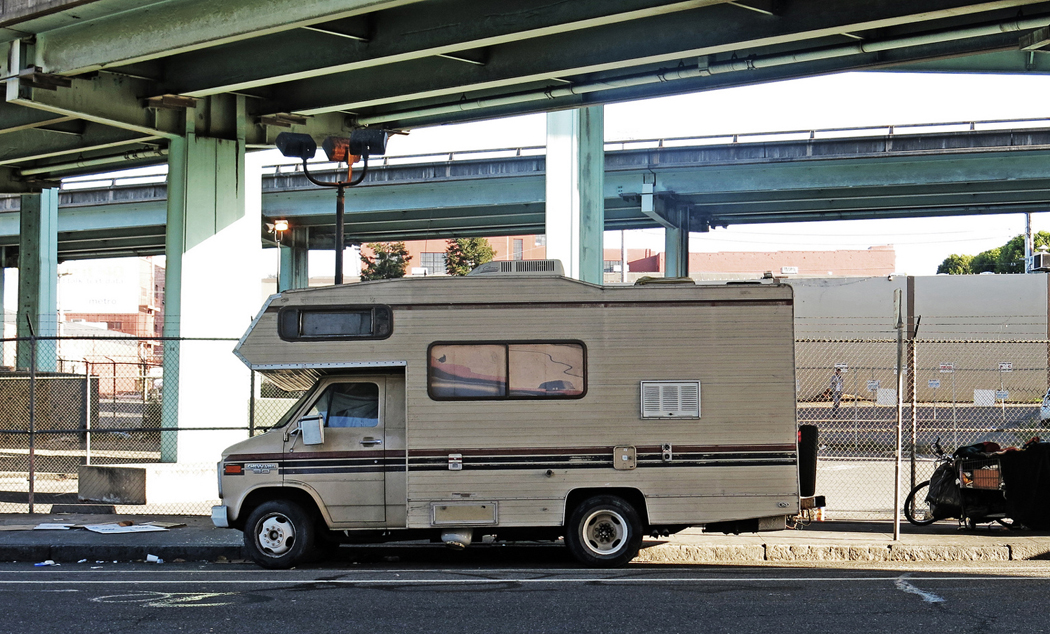by TJ Johnston
[dropcap]T[/dropcap]he world just got smaller for Melodie. The streets where she can park her RV, which has also been her home for six years, are now fewer and farther between because a year-old ban on oversized vehicles has been expanded to more neighborhoods throughout San Francisco.
The San Francisco Municipal Transportation Agency’s board of directors approved the expansion on March 4, 2014. In 2013, a pilot program was enacted, prohibiting vehicles longer than 22 feet or higher than seven feet from on-street parking from midnight to 6 a.m.
Ostensibly, the program was intended to exclude commercial vehicles from residential areas, but SFMTA project manager Andy Thorley admitted that only half of the oversize vehicles could be described as commercial.
Advocates from the Coalition on Homelessness and allied groups said the measure would drive away people who live in their RVs or vans, or risk citations and impoundment.
The ban would add 61 new locations, covering about 10 miles of street space, and it would take effect once “no parking” signs are posted.
Aides from Supervisors Katy Tang and London Breed’s offices spoke before the board endorsing the plan. However, those from Jane Kim and David Campos’ offices — opponents of the initial ban — were absent, even after contact by the Coalition on Homelessness.
Melodie, who is 55 and goes by just one name, spoke out against the ban’s expansion — and its consequent penalization on vehicular residents — at the March 4 meeting.
“I understand (the SFMTA) did not plan to extend the number of streets for oversize vehicle restrictions,” she told the board. “I assure you I do not want to break the law.”
In an interview after the board’s decision, Melodie, who suffers from traumatic brain injury, said the need to be constantly vigilant for police officers serving 72-hour warnings exerts physical and emotional strain on auto dwellers.
“We can’t get rest and are perpetually stressed,” she said. “This enforcement feels like terrorism, and I haven’t done anything wrong.” She added that people living in their vehicles do not have the luxury of getting their lives in order in time to keep in compliance with the law.

Melodie recalled that officers last year did not even wait before the initial ban took effect, demanding that she move her RV. Also, she said the tires on her camper were sabotaged by officers, while she was inside.
Nick Kamura, a Coalition volunteer, said the resulting migration of vehicularly housed people after the ban’s initial phase signifies a failure in homeless policy. “In my mind, this is displacement,” he said. “It’s just not getting to the root of the problem, and the problem is people living in their vehicles, and they’re being criminalized for it.”
The city is also seeing more folks making homes of their rides. According to last year’s homeless survey, 13 percent of people without housing, or about 120 people, report sleeping in their cars, trucks, vans and campers. That represented a jump from 2011, when 3 percent — some 30 people — said they camped in their vehicles. The figures could actually be higher than the city’s estimates because the biennial tally is regarded as an undercount, according to the homeless advocacy community.
Vehicularly housed people risk their wheeled homes being confiscated if unpaid citations pile up. Their vehicles are often the last line of support before living on the streets or in shelters, and Melodie fears enforcement will put car dwellers on the fast track to homelessness.
“There is a frightening thoroughness and deliberateness that terrifies me,” she said. “Everything depends on the humanity of the police and meter maids. Because we have no rights, everything can be taken away from us.”
